Famalay, Temple Of, Nūr: How Prague’s Diaspora Club Community Supports Itself
Published January, 2025
by Freddie Hudson
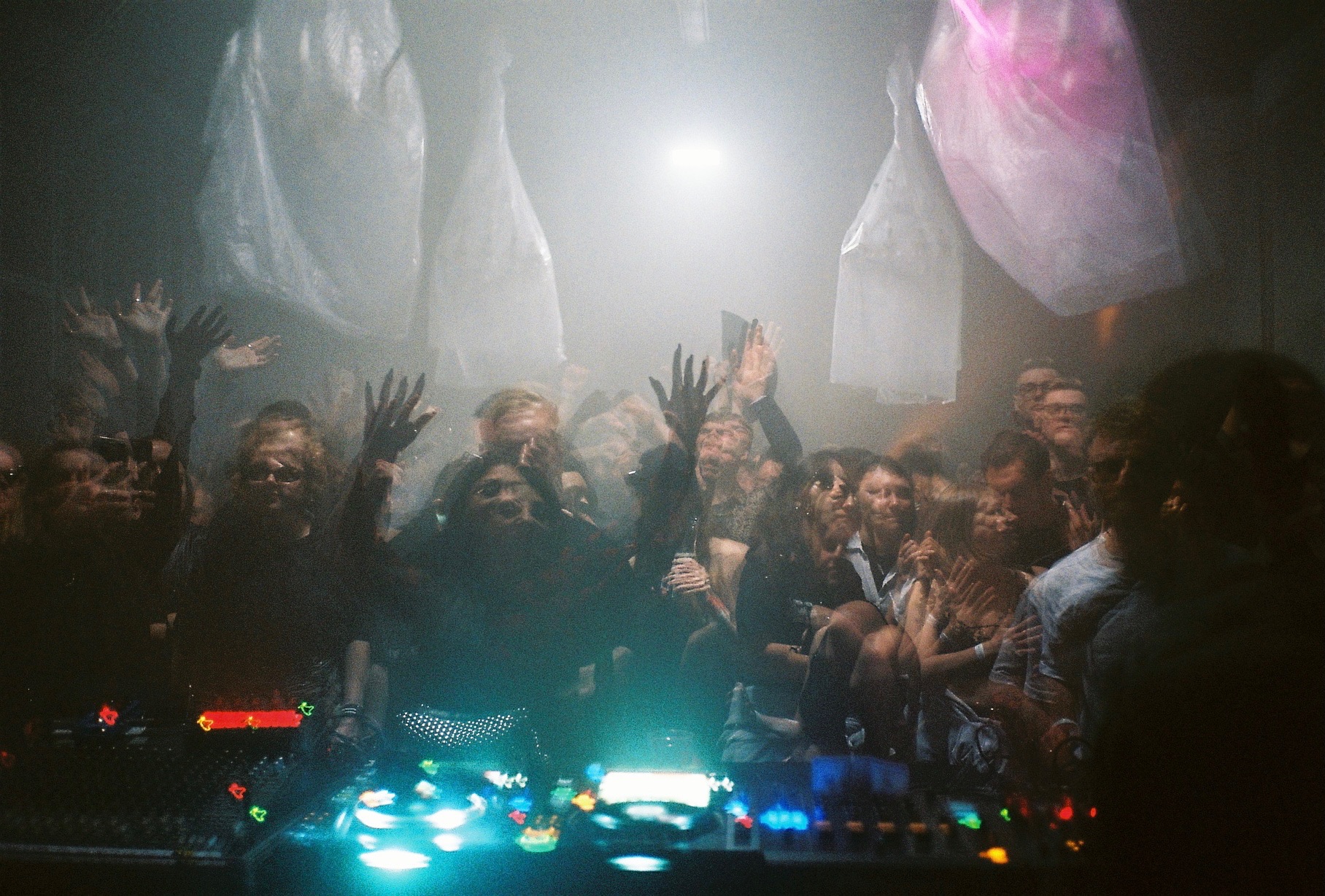
In the second of a series on Prague’s social and cultural diversity and its role in club culture (read here the first part), locally-based journalist Freddie Hudson takes a look at racial and ethnic diversity in the city through the eyes of three entities active in it’s nightlife: Famalay, Temple Of, and Egyptian DJ and event producer takaDumm.
Prague is one of the only European capital cities I’ve been to without a visibly significant local population of people of other ethnicities. According to Czechia’s 2021 census, six out of the 10.5 million people living here are ethnically Czech: the next lowest single-ethnicity denominations, Moravian (350,000) and Slovak (96,000), are such near neighbours as to be almost the same thing. Of the remains, it’s a shallow mix of Polish, Ukrainian and Russian — fellow Slavs — alongside Vietnamese, the one outlier to an outsider, explainable through the extensive Cultural Exchange programme under communism.
Outside of the major Czech cities (and besides the countrywide ubiquity of Vietnamese-owned restaurants and small businesses), signs of other ways of life are hard to find; even in the capital city the authentic can be difficult to spot. What Prague does have is a surging student population; people come from all over the world to study at the state universities providing free education in Czech, or at private universities which can offer a route to accessing an EU visa. This means that there’s a growing number of young people coming from diverse ethnic and cultural backgrounds, and making a home in what was, until just before the turn of the millennium, a largely mono-ethnic, mono-cultural society. These individuals, as with anyone living abroad, can often struggle with a lack of reminders of home — ingredients, culture, friends speaking the same language — and are increasingly finding their community within the nightlife industry of the city.
While perhaps not a concern of the majority of the people native to the country, racial issues are an important priority for those looking to understand Prague’s music scene fully, and demand testimony from the perspective(s) of those who live it. I wrote, in a recent interview with ESTROGUN, of how Czechia as a country battles with the contrasting politics of its geolocation; this holds true for tolerance of both gender expression and racial difference. A 15-year-long Harvard study into Europe’s “latent racism”, published in 2017, listed the Czechs as Europe’s most racist people. Like many similarly sensational studies, the shock of the surface result can muddy the reality of things: in 2015, just 54 people were convicted for hate crimes, amounting to 0.08% of convictions.
Whether this figure obscures the largely unreported, untreated reality of racism here is unquestionable, and no one living here, certainly not a person of colour, denies the hostility against people of a different ethnic background. Most, however, will add a mitigating sentence to the effect that the general experience with Czech people (“especially the younger generations”) is not described by such statistics. It’s not just that the mentality within Prague and the larger of the other cities is vastly different to that of the surrounding regions; the overwhelming majority of people you are introduced to are kind, welcoming, and apparently genuine. And yet, the country slides incrementally further right, by disinformation and fearmongery, with each passing year. Other British people might appreciate what it can mean for a nation’s trajectory, to have left-leaning metropolitan centres but a right-leaning countryside. Still, apples are not pears, and understanding some specifics of the Czech mindset towards those of other races required me asking those with experiences I cannot access.
I spoke with three entities in Prague that are running nights primarily for non-white audiences: Famalay is an events initiative created to fill a gap for African, Arab and Caribbean communities in the city, run by a creative sister duo — one a dancer, the other a DJ — of mixed Czech and Afro-Iraqi heritage; Temple Of (represented here by co-founder Lea Elisha / Kavkaz Widow), an event series curating events celebrating the cultural diversity of Prague’s broad immigrant and student communities, but especially those with roots stretching from North Africa right across to Central Asia; finally, Egyptian DJ and promoter, community organiser and co-founder of the Nūr events series Tohfa (AKA takaDumm), who shares some of his experiences from the frontlines of the Czech Palestinian solidarity movement, both within and without the nightlife industry.
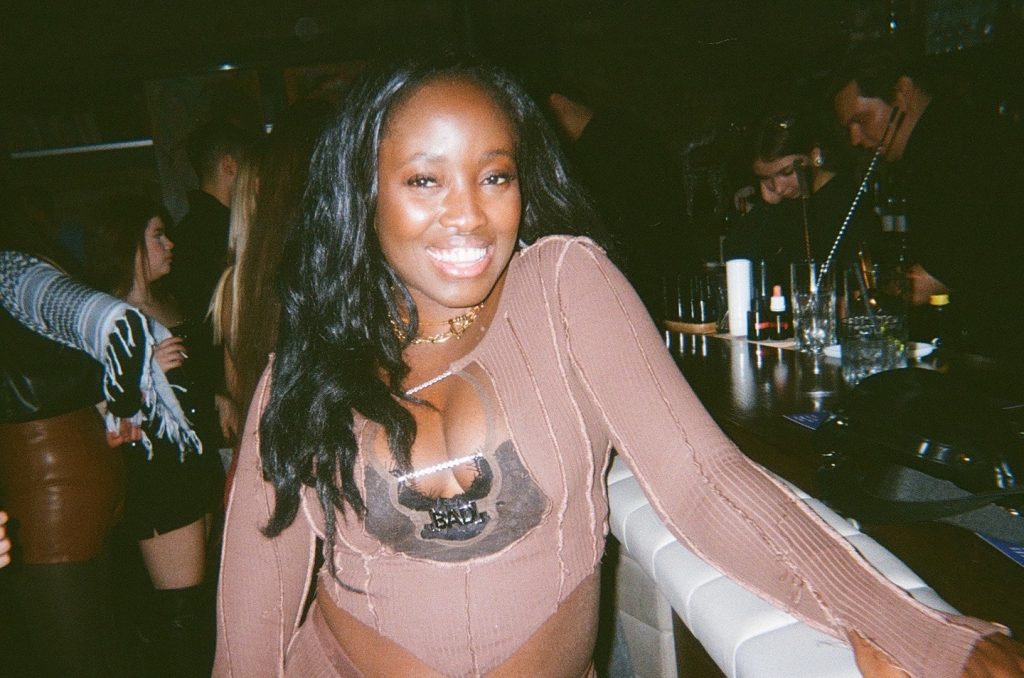
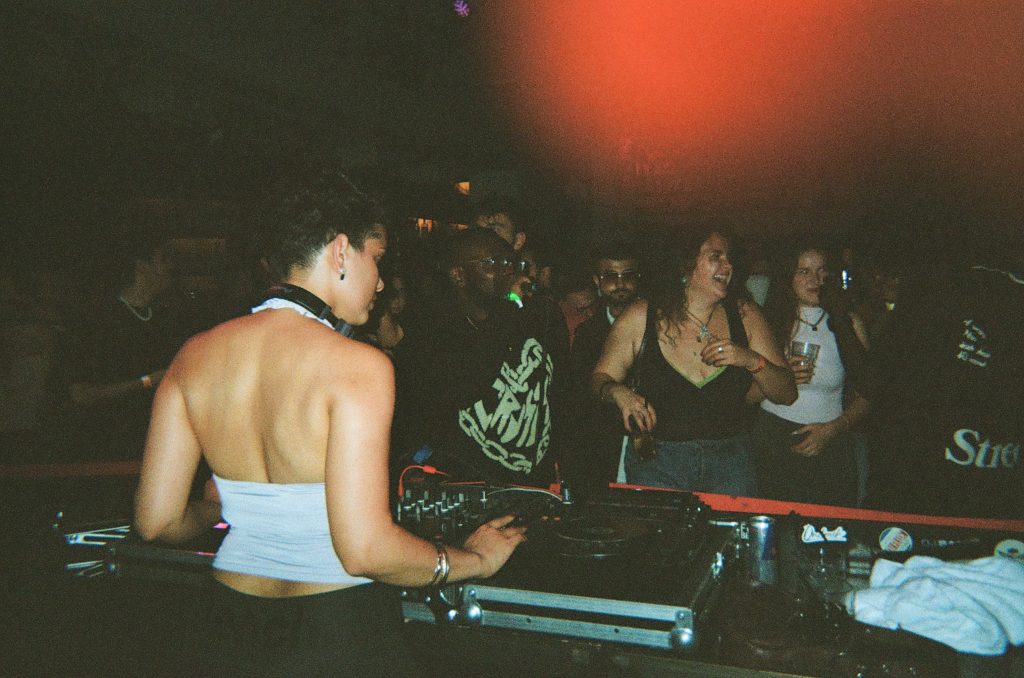
Famalay (Photo: Famalay)
In little Prague, smaller divisions of communities — people of colour, queer people, refugees, any other means — become incubators for solidarity, collective organisation, and for community across boundary lines. These entities all bear interesting cultural hallmarks, aimed at providing a familiar or homely experience for the small number of people living here belonging to that niche, while also appealing to the majority native Czech audience to stay financially operable, which presents opportunities for imposed or self-tokenisation. Rightfully, the most successful of these groups are vocal and proud of their identities, which can lead to the unasked-for task of educating the general public on terminology, mindset, or regional politics. It’s not uncommon for a little of a frustrated tone to creep into such messages.
The clubs and nightlife institutions here, from the roaming DIY crews to those with infrastructure and small government funding, appear to be learning from the telegraphed examples of groups in Berlin and London, and are giving more space and safety measures to people who need it, and publicly discuss certain political matters. Besides the ubiquitous checklist manifestos that you’ll find anywhere, some genuinely sizable real-world actions have been made such as establishing queer facecheck teams, onsite drug harm reduction, and friendlier security teams at the gates who prompt newcomers to familiarise themselves with the club’s standard of ethics. What social issues the typical Czech in the music scene may have not known about previously, through lack of exposure to the reality of problems or those suffering them, they are keen to educate themselves and others. Certainly the dance music scene here displays a particular compulsion, perhaps greater than any other city-based scene I know of, to educate its local crowd about the intersection of music, politics, and ethics, even when it’s about a group of people mostly unseen in day to day life here.
Events here may be divided into three crude groups: those which indicate no inclination towards meaningful political thought; those which try, to varying degrees, to incorporate safety measures and raise awareness of socio-political issues; those which mark themselves as safer events by and for certain minorities, and which typically assume a baseline level of emotional (and indeed general) intelligence about matters pertaining to those minorities. Perhaps this is not very different, on the whole, from any other city, but the unique social contexts of Czechia’s capital city leads me to see things here in a light of its own.
Just over a year ago I started seeing publicity for the Famalay night in Prague, showing a colourful poster and a bunch of playful videos taken at the last event. I saw a different class of night, with a different sound and different groups of people than I had seen before at a party in this city, something that reminded me more of the promotional posters outside clubs on Dalston High Street than what I’d grown accustomed to since moving here.
Initially I was surprised that there was a large enough audience for such a night in the city, and the sisters and co-founders Samira and Sára confirm that Famalay indeed started around five years ago as a casual mixer event for Black and mixed-race people, which gradually grew, addressing the lack of events and safe welcoming spaces for such people as it did so. The pair also tell me that their consistent crowd of attendees has been instrumental in the night growing from a small event, to a medium gathering of 30 people, to running takeovers in venues more commonly associated with the nightlife scene of the city; they will soon move onto producing events monthly.
Famalay channels its energies in creating a place where attendees see ”a room full of faces that look like theirs, hear voices that speak the same language or echo similar journeys, and share a dance floor with people who understand their rhythm”. It’s not just about showcasing familiar styles of music such as afrobeats, dancehall or amapiano, but creating “a space that truly represents us, and we can fully show up as we are”. They don’t only get African, Arab and Caribbean descent attendees and their friends, and although they see familiar faces returning for every event since the first, the rest of the crowd may have come from quite far — even from abroad — to be part of the event. It’s not by coincidence, but by intention; Famalay’s prime value is its intentional building of community, brick by brick.
The sisters suggest that the secret ingredient to their success with the series is their own unfulfilled desire for a supportive community in their early life. Born and raised in Czechia in the 90’s and early 2000’s, and being of mixed Afro-Iraqi and Czech heritage, the pair experienced an environment with far less diversity than they would later experience after moving to London for a decade — Sára, who DJs as Rára, is still based there, while Samira relocated to Prague at the end of 2022. The two spent a period commuting between the two cities in order to produce their events, but it was “the time spent in London [that] really opened our eyes to the power of strong communities and safe spaces where diverse cultures can thrive, despite the UK’s deep-rooted anti-Blackness”, lessons which inspired them to bring something similar to Prague, in “a natural next step, given the lack of such spaces when we were younger”.
Throughout, they have championed Black and Black women DJs to soundtrack their events. Asked about the sound of the parties away from genre descriptors, they say “it’s intentional, personal, and crafted to resonate with our audience”, a meaningful blend of fresh and new music and nostalgic hits. For Sára and Samira, that has always included Arab music, through their Afro-Iraqi family. Over their events throughout 2023, they began foregrounding Arab music and booking rising Arab DJs as well, such as Youssef Motus and takaDumm. Each of these selectors deliver sets incorporating trance, jungle, and traditional dance music from across and beyond the Arab world, while a typical Famalay night deals out dabke, soca, bouyon, gqom, kwaito, baile funk and Ghanaian highlife — to get the list started.
Musically, Prague is still only just beginning to move out of the domineering shadow of European and American techno, and “spaces where Black people could go were limited to commercial clubs” playing a blend of hip-hop and commercial (“rinsed”) dance music. As Czech nightlife adds afrobeats and music from other shores to its repertoire, Famalay offers a rare and authentic experience of those genres in a shared setting amongst those who can claim direct ownership of the music.
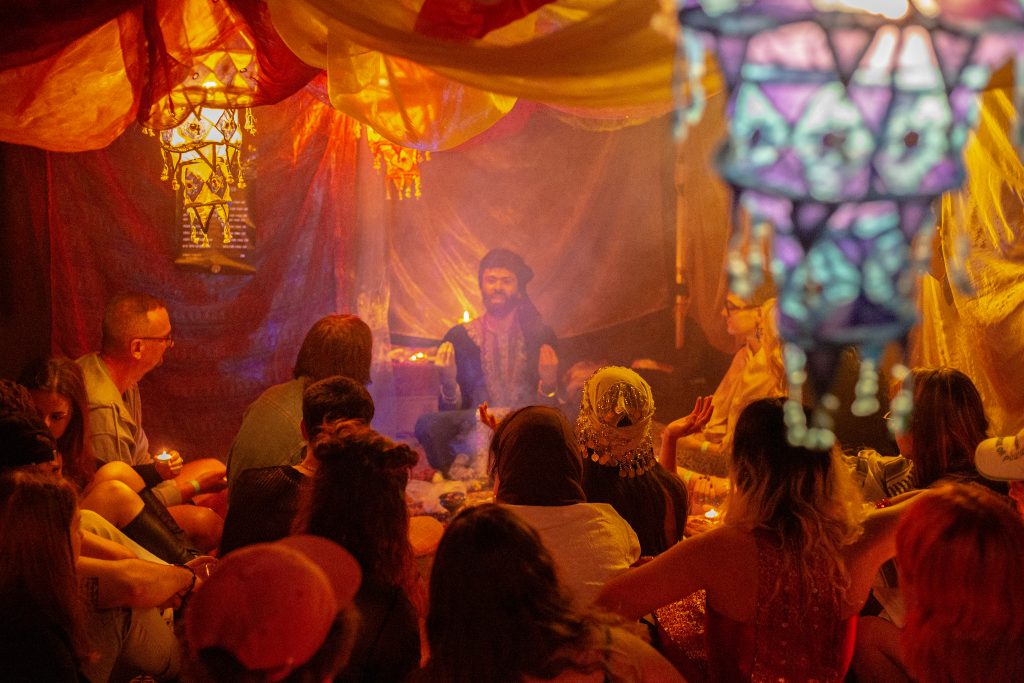
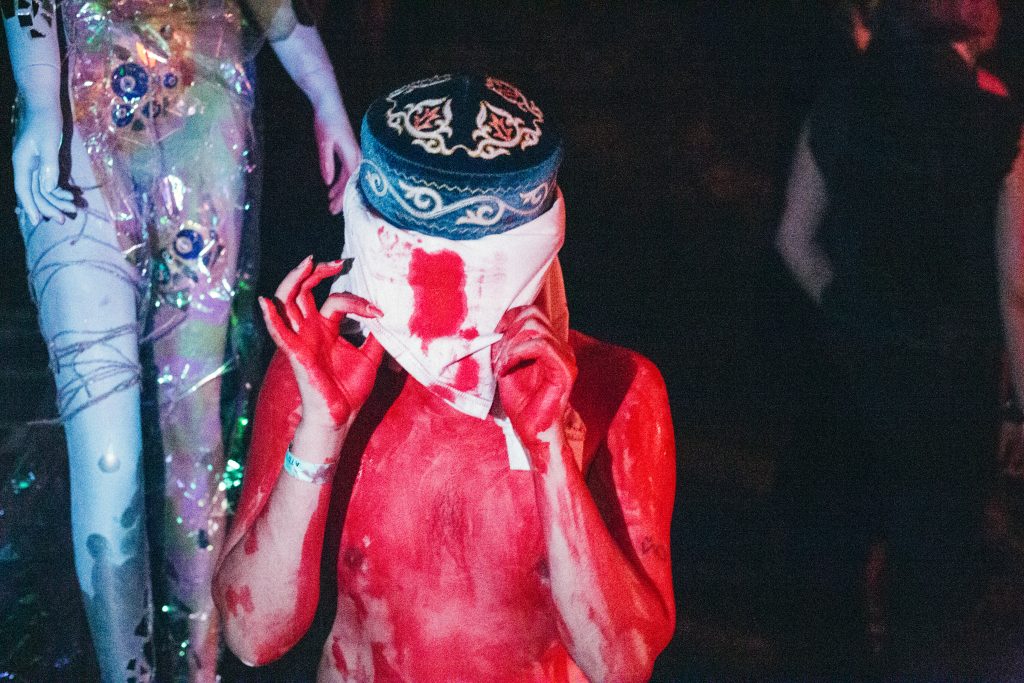
Temple Of (Photo Alena Stepanova)
Fellow itinerant party Temple Of, also running for a couple of years now, similarly prioritises the experience of their community. Over email, co-founder Lea Elisha gives me a significant amount of nuanced information about the event and how it is run in addition to what I’ve pieced together myself. Temple Of events are much more than a set of speakers and decks on a table; they are, just like Famalay, “evoking the warmth of grandma’s living room”, the essence of a missed home. Events balance a full-throttle club floor, a bouncier, lighter room also of dance music, and a room dedicated to pop, folk, disco and traditional music from the Sahel to Georgia to Kyrgyzstan. There is usually at least one performance artist, and always a uniquely decorated clubspace to welcome visitors, always representing artists from (quite broadly speaking) Southwest and Central Asia and North Africa.
For Temple of, solidarity and support is as complex and deeply intersectional a matter as the peoples they aim to represent. “Georgian, Armenian, Arab, Azeri, Jewish, Kyrgyz, Uzbek… we’re hoping to build something that not only celebrates our cultures but fights against erasure”. It’s maybe the first music collective I’ve known in a lifetime of interest who fight for people of such a broad, yet also particularly specified, swathe of origin, regardless of any other uniting factor, and throughout my experiences with the collective I’m led to feel this is not without good cause. A child of wartime refugees, Lea tells me that the suggestion was made by a Czech translator to remove the word “immigrant” from the collective’s biography as it has poor connotations; the idea that people might not identify negatively with this term didn’t occur. I’m also told that Czech local DJs were using outdated terminology like ‘oriental’ in their biographies to describe their sound.
For the communities of people of colour that I’ve spoken to, access to the established nightlife industry is essential to continue providing safe enjoyment in the city. With every nationality but Czech in such relative a minority here, wearing your stripes is one way to make sure you’re seen for who you are, and not allowing oneself to be reduced to merely an indistinct “other”: “if we can spark even a little curiosity, perhaps we can help stop this erasure from continuing”, Lea writes.
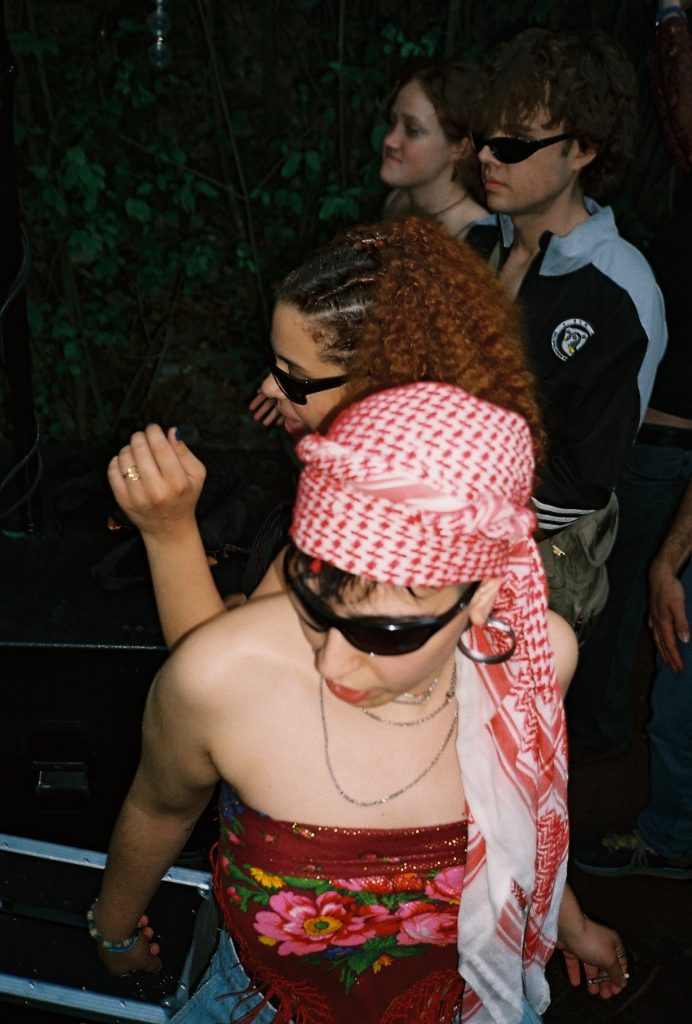
Nūr – Photo @Ldrekaj
This has pertinent applications to Palestinian solidarity in the city: Lea and others in the group have been labelled as “Jewish traitor[s]” or as anti-Semitic for posting about Palestine or a fundraiser event for Lebanon. Lea’s stance on such people needs no expansion: “don’t even think of coming to Temple Of… get out of our space”. It’s made clear that the huge welcoming embrace of the collective is only extended if you’re accepting of their ideology yourself, but being a night with plenty of queer attendees, performers and DJs, you do want such defenders at the gates. It pays to be safe.
My last informant for this piece is Tohfa, who DJs frequently, as takaDumm. As a standalone DJ, he’s been in increasingly high demand since becoming a visibly key part of the organisation for Palestinian solidarity and his unequivocal position on social media. The promotional photographs used for the nights he plays show him proudly wearing his kuffiyeh, pumping his fist, familiar scenes at the Nūr events which he runs as a collective with seven others. Over a coffee, he tells me, “I think it’s really important to have people from different places. In Nūr we have people from Czechia, USA, Egypt, Brazil… each of us has an influence”, and while he doesn’t state exactly why it’s important, it becomes clear from knowing the group and visiting the events.
I’d attended the recent one, an endurance-grade party from early Friday evening until midnight Saturday, held in a never-before-used venue just beyond Prague’s city limits on the banks of the Vltava. The awkward distance and competing events that evening didn’t make for the best show of numbers, but who did come demonstrated a huge diversity of background and expression of identity. The night began with two ambient live sets, which brought a mixture of frustration and delighted surprise, before plunging the clubbers into a wormhole of club music upstairs, with a hall of ambient respite below ground.
I’d bet that the importance Tohfa spoke of is in the universal truth that a wider pool of creative influences makes for a more broadly appealing event. He tells me later that “there was a statement from owners of Ankali that… before COVID, there were no expats involved in the music scene here… but Kave, Hereandthere, [and] Nūr all brought an expat community that is adding to what already existed.” Each of these parties are, or were, helmed and frequented by a lot of foreigners from a truly diverse set of backgrounds, multi-ethnic American, Arab, Kazakh and Turkish people. I visited Kave shortly after moving to the city and it was clear to see why it pulled a crowd: a secret path wound within Old Town buildings, ending up in what seemed to be an old beer cellar network below ground, about 200 metres as the crow flies from a huge tourist square and Prague’s Astronomical Clock. There was a floor that sounded far too loud for the illegal location and a labyrinthine complex of lavishly decorated rooms, and I remember feeling that, unlike in the established nightclubs, the crowd was almost entirely foreign students and/or queer people.
Such a uniquely illicit space as it was, no one was surprised when Kave closed. Members of the collective — Kazakhs, Turkish, Americans and more — set up Hereandthere, which has just recently opened, for the second time, an ephemeral club space for a limited series of events. Two years ago, my conversation with Tohfa would have been about the latest revitalisation of a centrally-located venue named Grid which he helmed alongside light designer and DJ Pablo Garduño. For the short time it was under their watch, the two managed a manic near-daily events schedule featuring life drawing sessions, hedonistic club events, ambient music, concerts, vernissages and gallery openings; at most events I went to there was a large, youthful crowd.
Prague’s student population is booming, and experience has shown Tohfa that they’re looking for fun. “I don’t think you would see 2000 or 1500 people at a party here before COVID, but now, Komiks, Harmony, Nite Vibes, they have that audience”. While these parties are all run by local crews, the influence and involvement of people from other cultures has made a notable impact on the curation and overall experience of many, as well as their peers. Not too long ago, Nūr ran a party with over 900 people, a fairly ludicrous number for the city, especially given the fact that it was a last minute thing — their off-venue location was made unavailable the night before the event. Although the group were happy to recover their sunk costs, the massive scale of the party left a bad taste: “It was a super bad crowd… there were our people, but there were so many random human beings as well”.
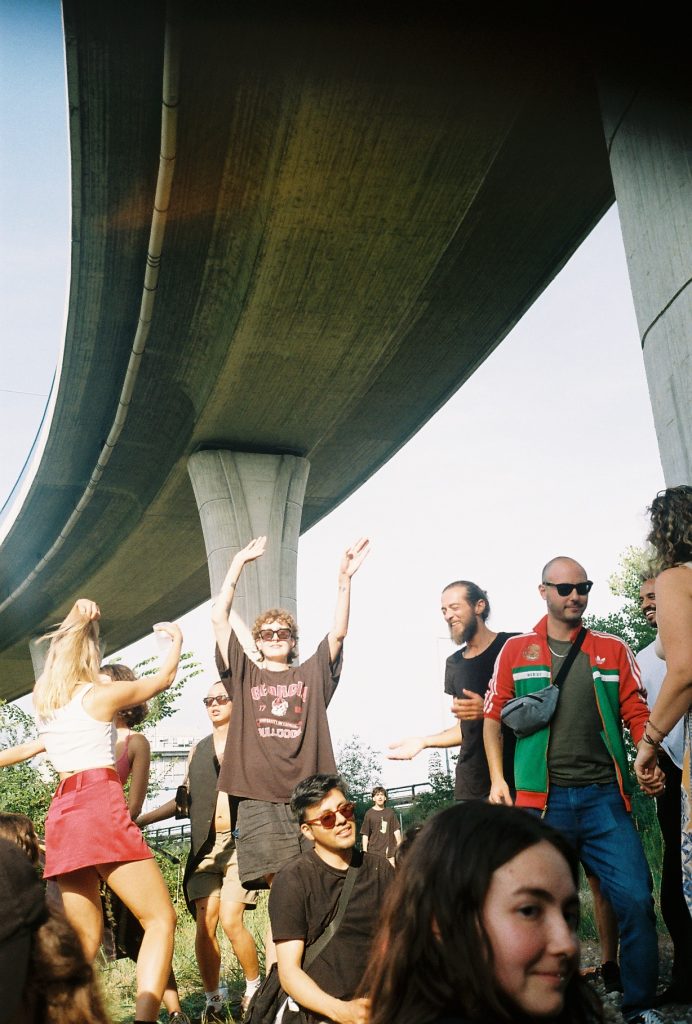
Nūr – Photo @Ldrekaj
Having come from running nights for five guests in an invisible bar, you wouldn’t blame the group for getting a little excited about the idea of bringing so many people to an event, but since this, Nūr keeps tighter reins on scale, ensuring everyone from the organisers to the punters is happy. Nūr has been busy this year, with several free parties in forgotten spaces in tandem with ticketed events in atypical venues. Each member works with full autonomy on the area of their passion — be it photography, social media, bookings, stage design, production, and so on — with everyone pitching in on the dirty work. They even allocate a budget for completing the “pre-work” for a party; Nūr’s DJs might not always get paid for playing their own event, but they are at least getting a sound rate of at least 10 euros an hour for helping set it up.
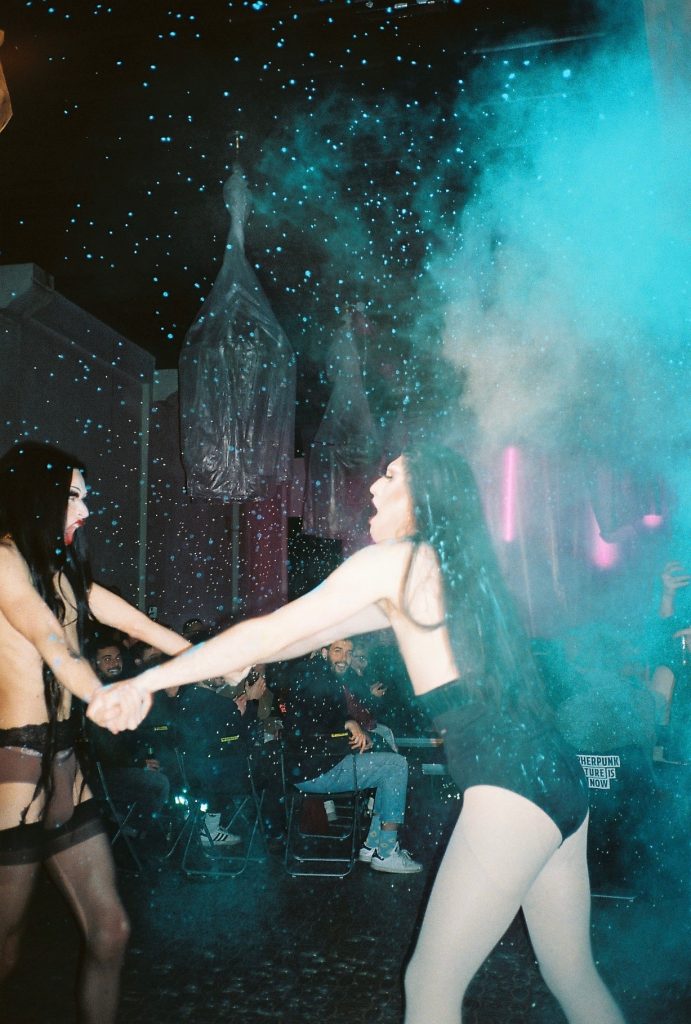
Nūr – Photo @Ldrekaj
Tohfa has earned his place at the table through much personal effort, and he’s now firmly within the fold, working for clubs, helping Tábor’s Transforma Festival with booking artists like 3Phaz, and having each month several DJ bookings in Prague and beyond. His life and living is made in the club world, but while he’s open about loving the party scene he’s found in Europe, he remains in touch with the teachings of his Egyptian upbringing, and also in touch with others like him — especially since October 7th, 2023.
Nūr, like the others I’ve spoken to, has a queer politics embedded in its central members and its operational ethos. Nūr and its members are vocal supporters of Palestinian liberation — often to a degree of radicalism that’d make certain other European organisers crack into a sweat — and neither groups forget the other racialised tragedies afflicted against the likes of the Sudanese people or the Uyghur Muslims. But it is due to the public displays of solidarity with Palestine and the wider Arab diaspora, shown by Temple Of, Famalay, Nūr and many others, that draws an otherwise largely elusive and under-represented population of students and the freshly graduated, from the Arab region and elsewhere, to spaces they’d otherwise perhaps not venture into on religious grounds.
The mixing of his hemispheres of influence can draw flack from some of Tohfa’s more devout friends, just as his radical support for Palestine has alienated him from some of the locals: when confronted about the presence of gay and trans* individuals within a Palestinian activism group, Tohfa had to push back that “we are not in Egypt, we are not in Palestine, we are fighting for these causes here — and some of our friends are from Palestine and Egypt, and they are queer!” Absolute acceptance is rarely universal in any community, but the interconnectivity of the nightlife scene and its politics has made a significant impact here in Prague, particularly when experienced from within the city’s close social proximity. To a newcomer, it could feel like the scene is a mass of solidarity and awareness, but it’s within the last two years that panel talks, charity events and their ilk have properly burst onto programmes.
Popular nightclub Ankali hosts the occasional listening event, workshop, panel talk or political discussion, alongside the regular club programme, and has also housed semi-regular Palestine solidarity events, self-organised community gatherings with prints, posters and stickers for sale alongside information pamphlets and an urging word to join the next protest; something between a political rally, a local maker’s market, a club night, and a social mixer. Temple Of have hosted a few of their nights there, and vouch for it above any other space in the city: “For us, it’s a match made in purgatory”.
It’s unclear if the twisting of the phrase refers to general immigrant life, the lack of other suitable venue options, or to Prague itself, but over the four years I’ve lived in the country Ankali has taken the biggest steps to level the field, open the doors wider, and work to address the issues of diversity affecting a nightclub as a subsection of the society it exists in. They’re not alone, of course, and they’ve not always been leaders, nor on an exponential upward trajectory, but two aspects of the steps they’ve specifically made are worth considering. Firstly, the management makes great effort to re-contextualise what the club can mean as a social offering, with listening or community events outside of a Friday and Saturday night, free-before-midnight events, setting up Shella Radio in their backyard and housing the tumultuous studio of the multi-disciplinary collective Glory Affairs, home to artists from many backgrounds. They may lease Planeta Za, and sometimes also their listening room Pluto, for free, if the event aims to provide a sufficiently safe space for a small or marginalised community within the community. This shows the secondary importance, that in Czechia it is the organised physical spaces such as nightclubs, and not ephemeral or temporary locations, that are primary structures in providing necessary cultural infrastructure for excluded or othered groups.
In turn, the precarious nature of structured social resistance movements within the underground music scene in Czechia is revealed; a lot of what Ankali does — as well as frankly a staggering number of spaces across the city — receives some form of cultural funding from regional or ministerial pots. While Prague’s public funding for cultural initiatives is mostly felt through a booming creativity and densely-packed social calendar, the spurious nature of grant application approval makes for two key factors at play here. The first is that funding can go both up or down quite dramatically from one year to the next, which has some big consequences and some occasional boons. The more pertinent aspect in recent months, however, is the collar and the leash: while Ankali stuck to their moral guns and made their perspective on Palestine public, the majority of other clubs and significant (i.e. funded) events organisers in the city have made no statement since October 7th 2023. Although this has drawn ire in some places, it hasn’t transmuted into any significant action or widespread boycott. The majority of Czechs I speak to on this matter-of-factly reason that to do so would risk the discontinuation of the institution’s programme. Arguments appealing to solidarity or moral principle seldom sink in, even after more than 12 months, and a pivot in global public perception about Palestine.
While it must be impressed that cancellation and revocation of artist contracts due to a public stance on Palestine is far rarer here than in Berlin or Vienna, as I have been writing this piece a small queer gallery, SVĚTOVA 1, had its funding revoked by Prague 8 district council for displaying a sign of “terrorism”, the Palestinian flag. Czechia continues to contradictingly iterate the importance of a two state solution while simultaneously voting against (or abstaining from) UN general assembly motions concerning a ceasefire or Palestinian right to statehood.
The impact that Ankali has had on the largely uninformed youth’s perception of the Palestinian conflict, simply by maintaining a stalwart position, is incontrovertible; a respected institution with the right message can leverage a great deal more social gravitas than any individual. At Shella Radio, the latest community module attached to the Ankali complex, Tohfa and the rest of the team have begun to take a more hardline approach on those not seeing eye to eye with organisers on support for the movement, cancelling the residencies of “anyone still playing Berghain, About:Blank [two German nightlife institutions on the BDS list]… or who still has their Hör set online”. That’s not a particularly long list of people to begin with, but it becomes miniscule when you remove the native Czech DJs from the list. You might argue that the immigrant population here are the ones setting nightlife’s moral high bar.
Speaking of the country as a whole, I’d put my money on the root issue of Czechia’s brand of racism being a lack of exposure, and an apathy toward nurturing understanding, more than a intentional, nurtured hatred. The Vietnamese people who relocated under the cultural exchange programme between so-called Communist states in the late 1900’s are now established and respected members of society, even if they are typically restricted by expectation and systemic racism to certain occupations and roles. According to the same Harvard study mentioned at the start, the UK ranks amongst the lowest in Europe for racism, yet it seems true that you are more likely to find yourself greeting a fist due to your identity in Britain than you are in Czechia; the UK’s race riots of summer 2024 showed just how deeply ingrained British racial violence is, and how rapidly that spark can be brought to flame.
In stark contrast to the situation with Palestine, most promoters and individuals have made effort to raise funds or awareness for Ukrainian refugees, which the devil on my right tells me is a signifier of Czech white supremacy, while the angel to my left assuages me that the war in Ukraine is a much more daunting and immediate problem. There was a significant population of Ukrainian and Ukrainian-heritage people in Czechia long before the influx of those fleeing Russia’s aggression, however I overheard a quite casual anecdote from a local that gave me the impression they were branded with a similar status here as Polish or Romanian migrants were generally given in rural England. That has been reinforced over the years with conversations with people from ex-Yugoslavia, and the other ex-USSR states; one friend told me that some Czechs were amazed that she, being Ukrainian, could afford to set up a nightclub and bar.
Any negative bias had suddenly evaporated by the start of March 2022, though; the city was patterned in yellow and blue, local community centres were literally heaving with people donating warm clothes and sleeping bags, and the old Russo-centric street names were pasted over (Russia’s own embassy now sits just off a street called “Ukrainian Heroes”). Lately though, the creep of divisive rhetoric has (re-)emerged in the Czech mainstream media, saying there’s no telling how many more people will come, there’s no more room in Czechia — even as it often seems to be more than half empty — and that siphoning the flow of money and supplies might be necessary in the future.
The public mood has drifted away from total solidarity, organisation and sympathy, and with general anti-migrant rhetoric booming across the Global North, one becomes nervous about how much time and support Ukraine has on the pedestal. Even in the nightlife scene, there’s only been a rare event as part of the wide-roaming Motsion series (by Ukrainian DJ/Producers AXT and Andriy K / cusoon DJ) and a handful of one-off or calendar-mandated fundraiser/awareness events (organised under a live music and DJ model). The angel on my shoulder asks the devil seriously if it’s still a matter of white supremacy, or just something simpler.
In appraising the attitudes of the majority of native Czech people towards people of another race, there is a good case study in the Romani people, who represent approximately 3% of the Czech population and have existed here for centuries. Without actively engaging with Roma news sources, you don’t hear or see much about this group. In 2021 a 46-year old Romani man, Stanislav Tomáš, died shortly after a violent arrest by the Czech police in Teplice, in what video evidence showed to be a “Czech George Floyd”, replete with the exact same image of a knee to the neck. Amid widespread outrage, the court-ordered autopsy determined he died from heart failure after amphetamine use, and there was no wrongdoing found in the conduct of the three officers who stood above — and on — the handcuffed, struggling man. Tomáš’s death sparked protests against Police brutality towards Romani people from tiny Teplice to the Czech Embassy in Kosovo.
Even before this event, from high on the walls of the graffitied Fuchs2 (one of Prague’s most popular underground nightclubs) the words “BLACK LIVES MATTER, ROMA LIVES MATTER TOO” have blared out a strong message in meter-high lettering to the city. It’s unclear whether it was written at the club’s behest or by a random artist. This piece of graffiti, highly visible from popular sightseeing spots like the Letná district, represents the entirety of the local nightlife scene’s commitment to awareness of issues affecting Romani people. The paradigmatic and systemic ethnic subjugation of the Roma is even more intense than that suffered by the Vietnamese-Czechs, and Roma are nearly exclusively seen working undesirable, low-pay, and high-effort jobs across the city, such as cleaning the gutters and picking trash. A 2022 study found that extreme poverty threatens 80% of Romani people in the EU as a whole, and the percentage specifically within Czechia is 77%. A huge percentage of the homeless population appear to have Roma ancestry. In 2019, Pew Research found 66% of Czechs held unfavorable views of Romani people; a Romani-Czech paper declares “the voters are ineducable” against stronger waves of dehumanising fascist rhetoric.
The chief leftwing political role models are mostly disaffected punks of sorts, mostly still from the Soviet era, who’re variously poorly adjusted to capitalist Czechia. The closest thing the young have to a successful progressive party features a white man with dreadlocks known to DJ psytrance, and the most prominent people of colour in the political system include an incarcerated rapist and a Japanese-Czech anti-immigrant fascist, who is, as of January 2025, saddled with a request for arrest after his party erected AI-generated billboards inciting hatred against Black migrants and Roma people. With so much talk about the truly dismal state of the politics that encompasses the nightlife industry, and with so many well-read people within that community, one wonders whether it is the lack of transferral from party to policy that makes the Czech dance scene so despondent of its own political horizons. There seem to be few who advocate more eloquently for the rights of migrants and people of colour, locally and around the world, than those partying and working in the clubs, small NGO’s, and organisations like feminist publication Druhá Směna or Ciocia Czesia. Without a large-scale reshuffling of the established political class, little will change soon, but until then, the youth of all races living here are getting angrier, and more disaffected.
This article is brought to you as part of the EM GUIDE project – an initiative dedicated to empowering independent music magazines and strengthen the underground music scene in Europe. Read more about the project at emgui.de.
Funded by the European Union. Views and opinions expressed are however those of the author(s) only and do not necessarily reflect those of the European Union or the European Education and Culture Executive Agency (EACEA). Neither the European Union nor EACEA can be held responsible for them.